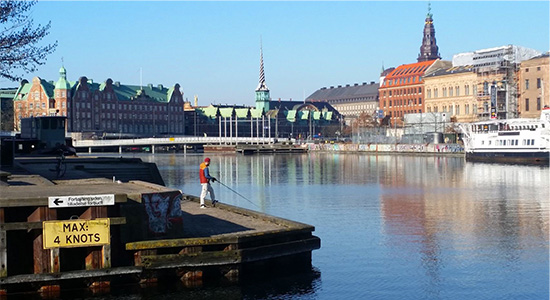
Covid-19 – Religion and existential wellbeing
The project investigates the impact of the Covid-19 crisis on religion and existential well being at the individual level through three surveys which allow the same persons in Denmark to respond at different points through the crisis. The the collection of the first survey comprising 1.500 persons ended 24 May 2020.

Foto: © Stig Toft Madsen
- The correlations between religion and Covid-19 in Denmark.
- The developments between personal wellbeing, values and attitudes towards the world, and their possible correlations to the development of the crisis.
- Changes in rituals and ritualized acts in relation to Covid-19 and the stability of such changes over time.
- Whether the respondents in Denmark distance themselves from religious beliefs, acts and authorities and associate themselves with secular authorities, politicians or other governmental actors or whether the crisis gives rise to an increased movement towards religious explanations, acts and authorities.
- Whether there are changes in the ritual acts and other acts whereas the basic belief system remains constant.
- Whether and how far the Danes understand the present challenge as a response to humans’ own behaviour (e.g. response of nature, response of God).
- Whether and how far there are correlations between the individual stress reactions and generalized trust to other persons and authorities.
- How the respondents react to the ban on collective rituals in Denmark (partly lifted Monday, 18 May 2020).
- Whether the respondents have engaged in other forms of collective rituals than the religious (e.g. the morning songs arranged in the National TV and virtual church services).
- Whether we see an increase in private ritual behaviour replacing collective rituals (e.g. ritualisation of washing one’s hands, private prayer).
- Whether various engagement in rituals correlate with indicators of psychical and physical wellbeing.
- And finally, how these possible changes develop after the crisis.
The survey for the first round of ”Covid-19 – Religion and Existential Well-being” was collected between 14rd and 21st May 2020. An allround analysis of the data is found in the Danish journal RvT Religionsvidenskabeligt Tidsskrift, 72, 2021 COVID-19 Religion, trivsel og eksistens.
The appendix on methods discuss the data and fit them into the setting of other earlier Danish surveys.
Please inquire for codes for recoded varibles found in the datasaet.
Since this collection two further collections from the same respondents (panel) have been added covering 23rd September – 9th October 2020 and 8 th– 21st March 2021. We are still working with those collections, but we are ready to provide specific parts of them for other researchers for specified analysis or to engage in formalised collaboration on parts of the data.
When the investigation is over data will be developed in a final form and submitted to the Danish National Archiegves from where they can be retrived freely.
Survey 14th – 21st May 2020 (pdf, in Danish)
Responses to selected questions 14th – 21st May 2020 (pdf, in Danish)
Datafile for the collection 14th – 21st May 2020 (SAV)
The data is in IBM SPSS format easily tranferable to a number of other formates, but not to all. We will provide advice on some possiblities, but we cannot submit data in other formatet han it is possible to export to from SPSS.
- The thirteen research groups funded by THE VELUX FOUNDATIONS' Covid-19 initiative
- The project Sammen – hver for sig. Virtuelle ritualers betydning i en krisetid by Katrine Frøkjær Baunvig (PI) baunvig@cas.au.dk
- Center for Samtidsreligion, Aarhus Universitet, Religion og COVID-19
Researchers
From UCPH
| Name | Title | Phone | |
|---|---|---|---|
| Brian Arly Jacobsen | Associate Professor | +4551302481 | |
| Peter Birkelund Andersen | Associate Professor |
Funding
This project has received funding from THE VELUX FOUNDATIONS' Covid-19 initiative
PI: Peter Birkelund Andersen
Project period: 18 March 2020 - 18 March 2023

Other researchers
| Name | Title | Phone | |
|---|---|---|---|
| Hanne Würtzen | |||
| Heidi Frølund Pedersen | |||
| Henrik Reintoft Christensen | |||
| Jesper Frøklær Sørensen | |||
| Lene Kühle | |||
| Peter la Cour |

